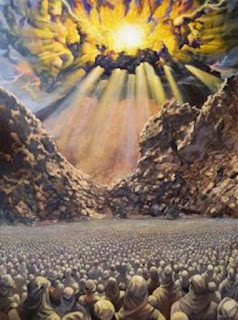THE LIVES OF THE PATRIARCHS #123 | THE LIFE OF MOSES #104
Pastor Christopher Choo
Lesson 3808
THE LIVES OF THE PATRIARCHS #123
THE LIFE OF MOSES #104
MOSES AND MT.SINAI #3
WHY IS MT. SINAI SO SIGNIFICANT?
This mountain is where Moses received the Ten Commandments from God Himself - a momentous historical event that changed the world.
"The mountain of God” is another name in the Bible for Mount Horeb or Mount Sinai (Exodus 3:1; 4:27; 18:5).
Horeb comes from a Hebrew term meaning “desert.”
Most of the events that the book of Exodus describes as happening at Mount Sinai are located at Mount Horeb in the book of Deuteronomy.
Deuteronomy uses the name Horeb
exclusively for the mountain of God.
A. MOSES AT MT. SINAI/HOREB BEFORE THE EXODUS
Before the Exodus, while Moses was tending the flocks of his father-in-law, Jethro, he came one day to the slopes of Mount Horeb. There he caught sight of a bush that was on fire but not burning up. As Moses investigated the phenomenon, God spoke to him from the flames. Calling him by name, the Lord told Moses to go to Pharaoh and deliver the people of Israel out of slavery in Egypt (Exodus 3:1–12).
B. MOSES AT MT. SINAI/HOREB AFTER THE EXODUS.
After the Exodus, as the people wandered in the desert, they suffered from thirst and began to complain to Moses about having no water. The Lord commanded Moses to strike the rock at Horeb to obtain water to drink (Exodus 17:1–7).
In Exodus 19—20, the Israelites camped at the base of Mount Horeb while Moses went up the mountain to receive instructions from God.
The people were told that from the mountain they would receive the commandments of God, and even hear the Lord’s voice.
After three days of preparation, God would come down in the sight of all the people. Moses set boundaries on where they could go, and under the penalty of death, they were prohibited from even touching the mountain.
On the third day, amid thunder, lightning, and trumpet blasts, a thick cloud of smoke engulfed the mountain as God descended on it.
Then Moses brought down the Ten Commandments and all the instructions of the law.
The book of Deuteronomy reiterates that on Mount Horeb God made a covenant with the people of Israel (Deuteronomy 5:2) and handed down the Ten Commandments (Deuteronomy 5:6–21).
Also, while camped at Mount Horeb, the people made a golden idol in the shape of a calf to worship, provoking God’s wrath (Deuteronomy 9:13–29; Psalm 106:19).
From Mount Horeb, the Israelites set out toward Kadesh-barnea, an eleven-day journey (Deuteronomy 1:2, 19).
Much later, the prophet Elijah fled to Mount Horeb because of Jezebel’s wrath (1 Kings 19:1–8). There he stayed in a cave and had an extraordinary encounter with God, who spoke to him not in the windstorm, earthquake, or fire, but in a gentle whisper.
On Horeb God also instructed Elijah to anoint Hazael as king over Syria and Jehu over Israel, and He named Elisha as the prophet to succeed Elijah (1 Kings 19:9–21).
C. CONCLUSION
The significance of Mt.Sinai/Horeb should NOT be
underestimated.
There the children of Israel received the Ten Commandments on the day of Pentecost - 50 days after they left Egypt by foot.
What happened - centuries later - on the Day of Pentecost on another mountain (Mt.Zion) in hilly Jerusalem?
The Holy Spirit was given to the Church as He descended with the sound of a mighty wind and with tongues of fire over the heads of the faithful disciples gathered in one accord at the Upper Room.
The Word of God and the Spirit of God were both given atop a mountain - symbolically the highest point where a man can come closest to the heavens.
There is so much revelation there as Moses mediated between God and mankind - pointing prophetically to Jesus as the greatest High Priest of our intercession as He bridged heaven and earth on our behalf by His Cross.




